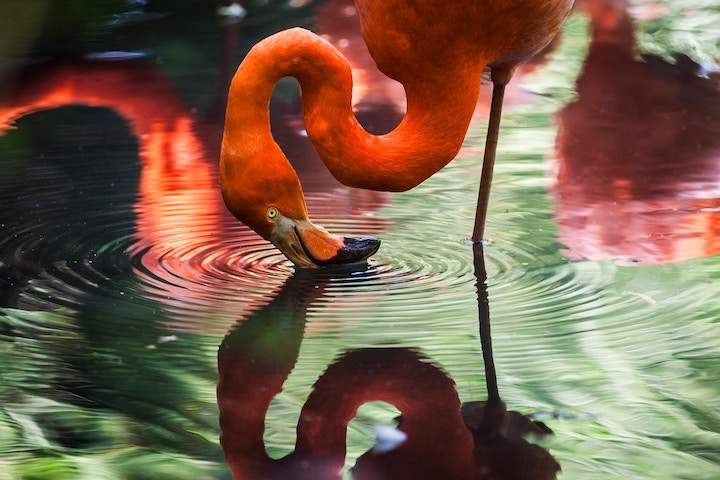Have you ever come across a dead flamingo? It’s a sight that may seem unsettling and morbid, but did you know that there is a deeper spiritual message behind it? These elegant and vibrant creatures hold a significant meaning beyond their physical form. While death is often associated with sorrow and loss, the dead flamingo can serve as a powerful symbol of transformation and new beginnings.
In this blog post, we will explore the surprising dead flamingo meaning and how it can bring a sense of hope and perspective to our lives. So, let’s dive into the meaning behind this unexpected encounter with a seemingly lifeless bird.
Key Takeaways
- A dead flamingo symbolizes transition, transformation, and rebirth, reminding us to embrace change on our spiritual journey.
- It urges us to let go of negative attachments and emotions, encouraging spiritual growth.
- The dead flamingo pushes us to embrace our true self, showcasing the importance of authenticity.
- It teaches us to trust our intuition, promoting confidence and clarity on our spiritual path.
- Symbolizing balance, a dead flamingo reminds us of the need to prioritize self-care and harmony in our lives.
Dead Flamingo Meaning
The spiritual meaning behind a dead flamingo is a fascinating topic to explore. While the physical sight of a dead flamingo can be jarring, it holds a deeper message from the afterlife that can guide us in our spiritual journeys. Here are 5 spiritual meanings associated with a dead flamingo:
1. Transition and Transformation: The death of a flamingo represents the end of one phase and the beginning of another. It symbolizes the process of transformation and rebirth, reminding us that change is an essential part of our spiritual journey. Just as the flamingo adapts and thrives in different environments, we too are called to embrace transformation and have faith in the journey ahead.
2. Letting Go: The presence of a dead flamingo serves as a reminder to release attachments and let go of negative influences. It urges us to free ourselves from any anger, fear, or resentment that may be weighing us down. By releasing these burdens, we can move forward on our spiritual path with lightness and clarity.
3. Embracing Authenticity: The dead flamingo encourages us to express ourselves authentically and boldly. It reminds us to step into our true selves without fear of judgment or criticism. By embracing our individuality and unique gifts, we can live a life that is aligned with our true purpose.
4. Trusting Intuition: The dead flamingo as a spiritual symbol teaches us to trust our instincts and inner voice. It serves as a reminder that in order to fully embrace our true selves, we must listen to our intuition and follow the path that feels right for us. By trusting our inner guidance, we can navigate our spiritual journey with confidence and clarity.
5. Finding Balance: The flamingo’s graceful balance on one leg symbolizes the importance of finding balance in our lives. The dead flamingo reminds us to prioritize self-care and to maintain a harmonious balance between our emotions and actions. By taking care of ourselves physically, mentally, and emotionally, we can live a life that is aligned with our spiritual well-being.
The spiritual meaning behind a dead flamingo holds powerful insights and guidance for our own spiritual journeys. It urges us to embrace transformation, let go of attachments, express ourselves authentically, trust our intuition, and find balance in all aspects of our lives. By delving into the world of the dead flamingo, we can uncover valuable lessons that will enrich our spiritual growth.

Dead Flamingo Symbolism
The symbolism of the dead flamingo goes beyond its spiritual meaning and can be found in various cultures around the world. While we have explored the spiritual meaning of a dead flamingo in the previous section, in this section, we will dive into the lesser-known and more unique symbolism associated with these beautiful creatures. Here are five uncommon dead flamingo symbolisms:
1. Illusion of Color: The vibrant pink feathers of a living flamingo often symbolize beauty and grace. However, the sight of a dead flamingo challenges this perception. The dead flamingo represents the fleeting nature of beauty and the illusion it can create. It reminds us that true beauty lies within and is not solely based on external appearances.
2. Hidden Resilience: Despite their delicate and graceful appearance, flamingos are known to be incredibly resilient creatures. They can withstand harsh conditions and adapt to various environments. The dead flamingo symbolizes the strength and resilience that lies within us, even in the face of adversity. It reminds us to tap into our hidden reserves of strength and find the resilience to overcome life’s challenges.
3. Unconventional Strength: The dead flamingo’s long, thin legs that once supported its graceful movements now appear fragile and lifeless. However, this symbolizes the concept of inner strength that may not always be evident at first glance. The dead flamingo teaches us that strength can come in unconventional forms and that appearances can be deceiving.
4. Symbol of Graceful Departure: Flamingos are known for their elegant and graceful movements, both in life and in death. The dead flamingo represents a peaceful and graceful departure from the physical realm. It reminds us to approach the end of life or the end of a phase with acceptance and grace, embracing the cycle of life and the inevitability of change.
5. Transcendence of Boundaries: Flamingos are often associated with tropical environments and vibrant ecosystems. However, they can be found in diverse habitats, including salt flats and alkaline lakes. The dead flamingo symbolizes the ability to transcend boundaries and thrive in unexpected places. It encourages us to explore new territories, break free from limitations, and embrace the unknown in our spiritual journeys.
These uncommon dead flamingo symbolisms shed light on the deeper meanings associated with these magnificent creatures. They remind us to look beyond the surface and embrace the complexity and beauty of life.
Also Read – Flamingo Dream Meaning
Dead Flamingo In Dreams
Dreams are often mysterious and filled with symbolic imagery that can provide insights into our subconscious thoughts and emotions. When it comes to the dead flamingo appearing in our dreams, it carries its own unique symbolism and meaning.
Dreaming of a dead flamingo can be unsettling, but it is important to remember that dreams are not always literal. Instead, they often reflect our innermost fears, desires, and unresolved issues. The dead flamingo in a dream may represent the end of a phase or the death of old habits and patterns. It could be a sign that you are ready to let go of attachments or negative influences that are holding you back from reaching your full potential.
This dream symbolism can also indicate the need for self-expression and authenticity. The dead flamingo encourages you to boldly step into your true self and embrace your individuality without fear of judgment or criticism. It may be a message from your subconscious, urging you to express yourself freely and without restraint.
Additionally, the dead flamingo in a dream could represent the need for change and transformation. Just as a flamingo goes through a transformative process in its life cycle, so too may you be experiencing a period of growth and evolution. The dream may be telling you to embrace change and venture into new territories, knowing that you have the strength and resilience to navigate unfamiliar waters.
The presence of a dead flamingo in your dream can also symbolize the release of negative emotions or the need to let go of past grievances. It may be a reminder to release any anger, fear, or resentment that may be weighing you down. By doing so, you can free yourself from their burdens and move forward on your spiritual journey with lightness and clarity.
In addition to these interpretations, it is important to consider the context and details of the dream. For example, the overall atmosphere and emotions experienced in the dream can provide further insights into its meaning. Pay attention to any other symbols or actions that may be present in the dream, as they can offer additional layers of interpretation.
Dreams are deeply personal experiences, and the interpretation of a dead flamingo appearing in your dreams will ultimately depend on your own unique circumstances and feelings. It is helpful to keep a dream journal and reflect on the recurring themes and symbols that arise. By exploring these symbols and their meanings, you can gain a deeper understanding of your own subconscious thoughts and emotions.
So, the next time you find yourself dreaming of a dead flamingo, remember to delve into its symbolic meaning. Allow the dream to guide you in exploring your innermost thoughts and emotions, and embrace the transformative journey that awaits.
Flamingo As A Spirit Animal
The dead flamingo holds a significant place in the realm of spirituality, not just as a symbol or a message from the afterlife, but also as a powerful spirit animal. As a spirit animal, the flamingo represents balance, harmony, and self-expression. It teaches us the importance of finding a balance between our emotions and our actions, and encourages us to express ourselves freely and without restraint.
When the flamingo appears as a spirit animal, it reminds us to let go of fear and to trust our instincts and intuition. It serves as a reminder that in order to fully embrace our true selves, we must listen to our inner voice and follow the path that feels right for us. The flamingo’s vibrant pink feathers and unique appearance reflect the importance of embracing our own uniqueness and expressing ourselves authentically.
Just as the flamingo gracefully navigates its environment, the flamingo as a spirit animal encourages us to navigate our own lives with grace and precision. It reminds us to trust in our ability to adapt and thrive in different situations, just as the flamingo thrives in salty lagoons and alkaline lakes. By embracing change and pushing past our limitations, we can grow and evolve in our spiritual journeys.
The flamingo as a spirit animal also symbolizes the importance of self-care and self-love. Flamingos are known for their ability to stand on one leg, which symbolizes stability and balance. This serves as a reminder to prioritize our own well-being and to take care of ourselves physically, mentally, and emotionally. When we are in alignment with ourselves and practicing self-care, we are better able to express our true selves and live a life of authenticity.
In addition, the flamingo as a spirit animal encourages us to surround ourselves with positive influences and to let go of any negative energies or people that may be holding us back. It reminds us to seek out environments and relationships that support our growth and allow us to express ourselves freely. By surrounding ourselves with positivity and love, we can further embrace our individuality and live a life that is true to ourselves.

Dead Flamingo In Various Cultures
Throughout history, the symbolism of animals has played a significant role in various cultures around the world. The dead flamingo is no exception, as it holds significant meaning and symbolism in different cultural contexts.
In ancient Egyptian culture, the flamingo was associated with the goddess Isis, who was revered as a powerful deity of magic and healing. The presence of a dead flamingo was believed to be a sign of protection and guidance from Isis in the afterlife. It was seen as a reminder of the goddess’s presence and her ability to assist the deceased in their spiritual journey.
In Native American cultures, the flamingo was seen as a symbol of balance and harmony. Its vibrant pink feathers and graceful movements were believed to represent the delicate balance between the physical and spiritual realms. The sight of a dead flamingo was seen as a reminder of the importance of maintaining this balance in life and in death.
In Chinese culture, the flamingo was associated with beauty and elegance. It was seen as a symbol of good fortune and prosperity. The death of a flamingo was considered a warning sign, indicating the potential loss of beauty or the disruption of harmony. It served as a reminder to appreciate and cherish the beauty and elegance in life, as it could be fleeting.
In Caribbean folklore, the flamingo was often associated with transformation and rebirth. The vibrant colors and unique appearance of the flamingo symbolized the ability to adapt and thrive in different environments. The presence of a dead flamingo was believed to signal a period of transition and change. It served as a reminder to embrace transformation and to have faith in the process of rebirth.
In Hawaiian culture, the flamingo was seen as a guardian spirit and a symbol of protection. The dead flamingo was believed to bring a message of guidance and support from the spirit world. It was seen as a reminder to trust in the spiritual journey and to have faith in the unseen forces that are guiding us.
In conclusion, the symbolism of the dead flamingo extends beyond its spiritual meaning and can be found in various cultures around the world. Whether it is seen as a sign of protection, balance, or transformation, the presence of a dead flamingo carries significant meaning and serves as a reminder to embrace the spiritual journey with an open heart and mind.
So, the next time you come across a dead flamingo, remember to consider the cultural significance it may hold and the messages it may be trying to convey. Allow it to guide you in your own spiritual exploration and understanding.
Dead Flamingo In Shamanic Practices
In shamanic practices, a profound respect for nature and its creatures plays a central role. Every creature, even in its passing, carries powerful insights and lessons from the spirit world. The presence of a dead flamingo during a shamanic ritual or journey holds profound symbolism and serves as a powerful guide on the spiritual path.
Flamingos, known for their striking appearance and adaptability, have long been recognized in shamanism as symbols of transformation and resilience. As such, a dead flamingo in shamanic practices can indicate a significant transition or change is taking place or needed in one’s life.
This change can be an invitation to release old patterns and ways of being that no longer serve our highest good. The dead flamingo serves as a poignant reminder that endings are necessary for new beginnings and that transformation, although sometimes challenging, can lead to profound spiritual growth.
Moreover, the dead flamingo can serve as a spirit guide during shamanic journeys. Its distinctive pink feathers, which are a result of its unique diet, remind us of the importance of nourishing ourselves physically, emotionally, and spiritually for our overall well-being. Just as the flamingo thrives in some of the harshest environments, we are encouraged to develop resilience and flexibility, facing life’s adversities with grace and strength.
During shamanic rituals or journeys, the flamingo’s message of balance also resonates deeply. Much like the flamingo, which stands on one leg for extended periods, we are reminded to strive for equilibrium in our lives and spiritual practices. This balance can be in our emotional state, our physical health, or the harmony between our spiritual and physical existence.
The encounter with a dead flamingo in shamanic practices, therefore, holds multiple layers of meaning. It urges us to embrace transformation, nourish ourselves, develop resilience, and seek balance in our spiritual journey.
Check Out – Flamingo Spiritual Meaning Unveiled: Embrace Divine Elegance
Flamingo In Astrology
In the fascinating world of astrology, every creature, including the flamboyant flamingo, holds unique significance. With its vibrant hue and distinctive form, the flamingo shares a compelling connection with Venus, the planet of love, beauty, and harmony. Venus, much like our flamingo, symbolizes grace, charm, and aesthetic pleasure.
When Venus is in a prominent position in your astrological chart, you might find an affinity with the flamingo’s characteristics. The flamingo’s embodiment of balance and its ability to thrive in diverse habitats echo the Venusian qualities of equilibrium and adaptability. Just as the flamingo stands on one leg, finding balance amidst the fluctuating tides, Venus in your chart could be calling you to cultivate harmony in your relationships and environment.
The flamingo’s flamboyant coloration, resulting from its unique diet, is a testament to its adaptability, another trait that resonates deeply with Venus. Venus rules Taurus, an earth sign known for its steadfastness, and Libra, an air sign known for its adaptability. Therefore, the flamingo, with its ability to thrive in changing conditions, beautifully encapsulates these dual aspects of Venus.
Interestingly, flamingos are most active during dawn and dusk, times associated with the ‘in-between’ or ‘transitional’ phases. This mirrors the astrological concept of ‘Venus twilights,’ where Venus as the ‘morning star’ or the ‘evening star’ symbolizes transition, an element that is a recurrent theme in the life of a flamingo.
While astrology doesn’t traditionally attribute a specific bird sign to each zodiac, anyone, regardless of their zodiac sign, can call upon the spiritual energy of the flamingo when seeking balance, navigating transitions, or embarking on new beginnings. So, the next time Venus takes center stage in your astrological chart, think of the gracious flamingo and its remarkable adaptability. It might just inspire you to welcome change with open wings and a balanced heart.

Conclusion
The death of a flamingo, as disconcerting as it may appear at first, holds a profound spiritual message that can guide us through life’s transitions and challenges. This mesmerizing creature reminds us to embrace the inevitable transformations of life with grace and courage. It encourages us to release attachments, express our authentic selves, trust our intuition, and seek balance in our lives.
The dead flamingo’s spiritual message is also echoed in various cultural beliefs and practices around the world, from ancient Egyptian and Native American cultures to Chinese traditions and Hawaiian folklore. It serves as a bridge between the physical and spiritual realms, offering guidance and support on our spiritual journey.
From its symbolism in dreams and its role as a spirit animal to its significance in shamanic practices and its connection with the astrological planet Venus, the dead flamingo invites us to delve deeper into our spiritual exploration. It challenges us to confront our fears, to adapt to new environments, and to discover our hidden strength and resilience.
So, the next time you encounter a dead flamingo, take a moment to reflect on its spiritual message. Let it inspire you to navigate life’s changes with grace, to express your true self without fear, and to embrace the journey of transformation and growth. Through its message, we can find comfort, wisdom, and guidance in our ever-evolving spiritual journey.
Frequently Asked Questions
- What should I do if I come across a dead flamingo?
Respect the creature’s passing and reflect on its spiritual message. It could be an opportunity to explore personal transformations or to let go of negative attachments.
- Can anyone have a flamingo as a spirit animal?
Absolutely! Spirit animals aren’t restricted by birth signs. If you resonate with the flamingo’s qualities, it could very well be your spirit animal.
- What if I dream of a dead flamingo?
Dream interpretation is subjective. However, generally, a dead flamingo in a dream might signal a period of change or the need for self-expression. Analyze the dream within the context of your personal circumstances.
- Do flamingos appear in astrology?
While not directly associated with zodiac signs, the flamingo is connected with Venus, symbolizing balance and adaptability, much like the bird itself.

